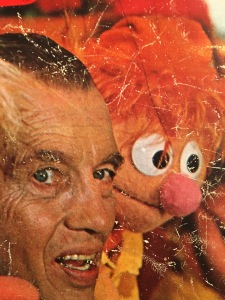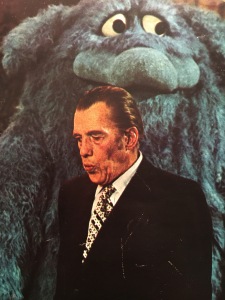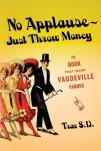 To be my age and a nerd (there, I said it) is to have been a big fan of The Muppet Show during its initial run (1976-1981).
To be my age and a nerd (there, I said it) is to have been a big fan of The Muppet Show during its initial run (1976-1981).
Though he is seldom categorized this way, I think Jim Henson ought to be considered the most successful of all New Vaudevillians. A hippie puppeteer, he was of the same generation, and shared many of the same approaches and sensibilities as The Flying Karamazov Brothers, Big Apple Circus, and scores of other artists and organizations that sprang up in the late 20th century. Henson, who got his start in the mid 50s, was actually on the leading edge of that movement. He’d gotten his start on tv variety shows, including the Ed Sullivan Show. The death of that show in 1971 marked the end of the line for old-school variety (that is variety created by folks who’d experienced the real heyday of vaudeville).


When Henson launched the vaudeville-inspired Muppet Show five years later, it was thus naturally a re-creation, a post-modern tribute. Much like the contemporaneous Gong Show, it was simultaneously nostalgic and modern. It was as much ABOUT entertainment as it was entertainment itself. Indeed, the Muppet Show was less a variety show than a show about a variety show. Such acts as it presented (aside from the weekly guest host) were fictional parodies. But all the vaudeville archetypes were represented: The emcee (Kermit), the diva (Miss Piggy), the hack comic (Fozzy Bear), the eccentric nut act (Gonzo), the accompanist (Rowlf the Dog) and even the stage manager (Scooter), and hecklers (Statler and Waldorf). Did this show inspire me to do what I do nowadays (and in the very way that I do it?) Yes!
Needless to say, I was (and am) an enormous fan of 1979’s The Muppet Movie, which was everything you’d want a Muppet Movie to be and a great deal more. A fictional origin story, exploded with in-jokes and meta-references, and studded with hallucinatory cameos by legendary show biz giants, including Bob Hope, Milton Berle, Edgar Bergen and Charlie McCarthy, Orson Welles, Mel Brooks, Steve Martin, and many others. And full of these great, funny, sentimental songs by Paul Williams — I wore out the grooves of the soundtrack record playing it so much.
After this, though, things changed. The subsequent Muppet movie sequels all seemed dreadful (I never watched more than a few minutes of them on television), and subsequent Muppet television projects were less interesting to me. (Anyone for the Muppet Babies?)
So, at any rate, the concept of a faithful re-boot co-written by and starring Jason Segal held much appeal for me. Segal was actually an infant when the original series went off the air, but he brings a necessary reverence (and just the right amount of irreverence) to the project. Who knows why or how Hollywood occasionally does things right? I imagine the returns from the old way of flogging the Muppet franchise had diminished to the point that the producers would try anything — including integrity — in order to breathe life into it again.
By calling it simply The Muppets, the concept unavoidably evokes the 1968 LP simply called The Beatles. Time to get back to roots, to look for the essence of the thing, and present a restatement. Consequently, the elements we prize so dearly in The Muppet Movie are brought back: a very simple, elemental plot (in this case, one borrowed from Mickey and Judy: “We have to save our theatre, let’s put on a show!), 4th-wall-breaking jokes, and celebrity cameos. That one of these cameos is by Mickey Rooney himself seems an overt wink to the origins of the plot, and the entire spirit of the movie. And above all, songs — terrific, sweet-natured, funny songs, exuding such a simple, positive spirit that I was frankly close to sobbing with happiness within five minutes into the film.
Which brings us to the new element. Something has happened in the 30+ years since the first Muppet film. Children’s films (to say nothing of most Hollywood films and ALL of American culture) have become, to quote Segal’s character in the film “hard” and “cynical”. This is parodied in The Muppets in the form of a reality game show called “Punch Teacher” where children have the opportunity to deck their humiliated teachers, who are trapped in stocks. The Muppets find themselves marginalized while this kind of programming holds sway. The rub is, somehow we all agree that it’s deplorable, but somehow most of us are contributing in one way or another to this cultural catastrophe. Except when we make the choice NOT to do so. For this reason, and a hundred others, I found this movie (like the original Muppet Show) totally inspirational.
To find out more about the history of vaudeville, consult No Applause, Just Throw Money: The Book That Made Vaudeville Famous, available at Amazon, Barnes and Noble, and wherever nutty books are sold.


If you’re a FKB fan, their long-time manager and choreographer now runs a Vaudeville Festival every spring in Seattle that’s well worth a visit if you’re in town.
LikeLike
You mean the Moisture Festival? I have performed there! And I’m dying to go back and do it again. Is that where you are based? I love your blog!
LikeLike
Awww, thanks! No, I’m in southern California, but I do try to visit Seattle whenever I can. The Moisture Festival is one of my favorites – let us know if you can share what you preformed! 🙂
LikeLike
Sure! well, I have a sort of jingle for my book “No Applause” that I perform on ukulele, and I also did this comedy magic trick bit I do, which essentially consists of lots of production and zero magic…can’t remember what else I did for my vaudeville turn (I generally just do comedy and songs, I don’t have any “skills” beyond that). And I also did a separate lecture about the history of vaudeville in Seattle. (Did you know, for example, that Jimi Hendrix’s grandparents were in vaudeville?)
LikeLike
Ah, Adam. I realized why I was no longer a fan by the time of “Great Muppet Caper”. By then, you see, I was 16 rather than 14 and was traipsing into transgressive new vistas
LikeLike
I loved The Great Muppet Caper, too! I haven’t seen it since I was 11, though. We’re going to be watching it on Netflix!
LikeLike
I look forward to it!
LikeLike
Two points, here:
1) The Great Muppet Caper, dreadful? Bite your tongue, sir. It’s easily the funniest of the three original films (the running gag about Kermit and Fozzie’s characters being brothers is brilliant and brilliantly executed), which means it’s head and shoulders above anything that’s come since. Charles Grodin does great work as the villain. And the London setting provides for some great Brit humor (and a cameo by John Cleese!). I’d almost argue that it’s superior to The Muppet Movie in many respects.
2) I really, really loved The Muppets, but there was one thing that stuck in my craw: The way Kermit was handled. To me, it seemed like the character was clinically depressed throughout the entire duration of the film. He was low at the beginning for obvious reasons, but then, even once he got motivated to try to get the gang back together, etc., he was brought crashing back down by every single hurdle they faced. Every time something difficult came up, he’d get all downbeat and say, “Oh. Well, I guess that’s it. It’s over.”
It was just WEIRD. It’s very contrary to the traditionally-accepted spirit of the character, who is generally optimistic, enthusiastic, and brimming with heart. I’m all for giving him an arc, starting him sad because of the circumstances and then letting him, like the Muppets, get his groove back over the course of the film’s story…but even at the end, he seemed so subdued and timid. As someone who grew up with the character, it was strangely unsettling.
LikeLike
Adam, are you a man or a Muppet?
LikeLike
I’m a very manly Muppet.
LikeLike
Longtime Muppet fans will undoubtedly have more fun than young ones, but for the most part, it’s a witty, delightful romp, that shows you that you can still be funny, without ever being mean still in 2011. Good review.
LikeLike
Right. On.
LikeLike
Thanks!
LikeLike